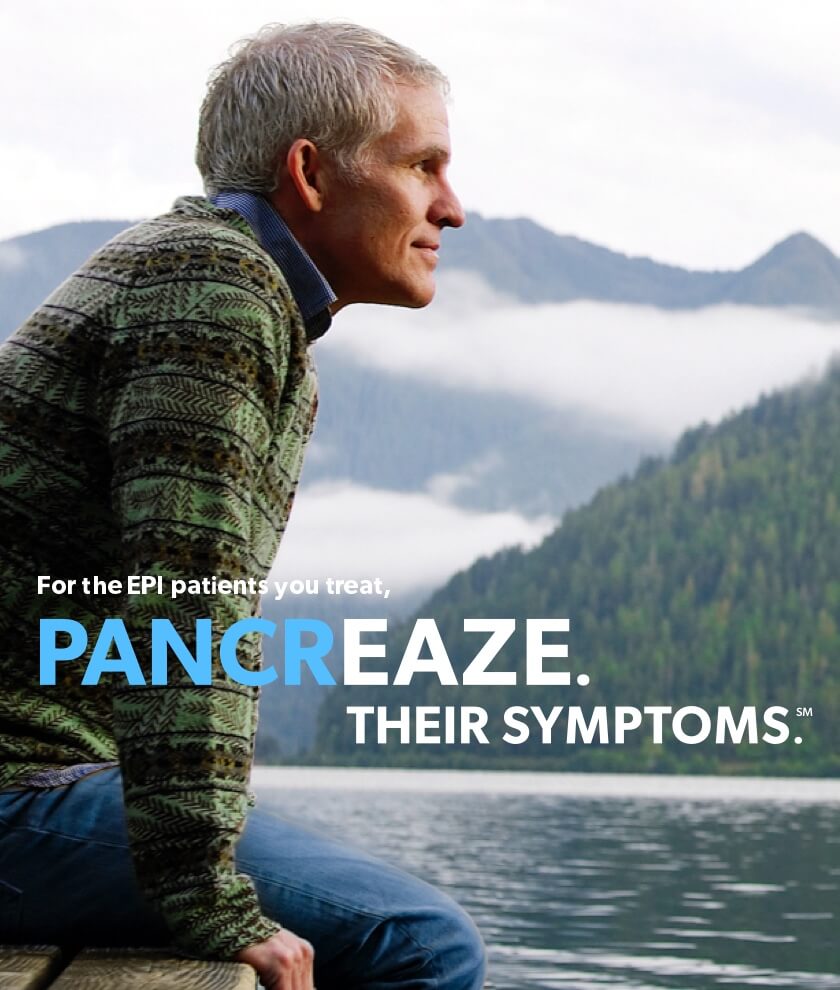PANCREAZE HCP Resource Center
Request materials, a rep call, or order samples of the 37,000 unit dose

The prevalence of EPI (Exocrine Pancreatic Insufficiency) in the general population is unknown. However, the prevalence of EPI can be fairly high among certain subgroups of individuals. The importance of a past medical, surgical, family and social history is important to explain the symptoms and guide investigations of potential EPI causes and a confirmed diagnosis.5
According to the AGA’s 2023 Clinical Practice Update Expert Review and Best Practice Advice, EPI should be considered in patients with moderate-risk clinical conditions, such as duodenal diseases, including celiac and Crohn's disease; previous intestinal surgery; longstanding diabetes mellitus; and hypersecretory states.4
Review the estimated prevalence of EPI by condition and surgical procedure:
Celiac Disease
12-30%
Chronic Pancreatitis (Mild - severe disease)
30-85%
Crohn’s Disease
14%
Ulcerative Colitis
22%
Cystic Fibrosis (Approximate EPI prevalence in newborns)
85%
Diabetes Type 1
26-44%
Diabetes Type 2
12-20%
HIV/AIDS
26-45%
Inflammatory Bowel Disease
19-30%
Inoperable Pancreatic Cancer
50-100%
Irritable Bowel Syndrome
4-6%
Surgery: Distal Pancreatectomy
19-80%
Sleeve Gastrectomy
5%
Surgery: Roux-en-Y Gastric Bypass†
9-31%
Biliopancreatic diversion with duodenal switch
75%
Surgery: Whipple
56-98%
Real patient perspectives — the path to EPI diagnosis†
Timely and accurate diagnosis of EPI is important, as delays in treatment prolong maldigestion and malabsorption, with potentially serious consequences for malnutrition, overall health and quality of life.7 In a recent online survey of EPI patients:
Of patients reported that 2 or more physicians were required for a confirmed diagnosis of EPI.
Of patients reported waiting more than a year to seek help for their symptoms.
Consider pancreatic enzyme insufficiency in your diagnosis of chronic GI symptoms.
PANCREAZE Engage offers a comprehensive collection of savings and support.
This tool can help with your PANCREAZE dosing considerations.
Learn more and access the following:
Request materials, a rep call, or order samples of the 37,000 unit dose
Indication
PANCREAZE is indicated for the treatment of exocrine pancreatic insufficiency in adult and pediatric patients.
Important Safety Information
Fibrosing Colonopathy: Associated with high doses, usually over prolonged use and in pediatric patients with cystic fibrosis. Colonic stricture reported in pediatric patients less than 12 years of age with dosages exceeding 6,000 lipase units/kg/meal. Monitor during treatment for progression of preexisting disease. Do not exceed the recommended dosage, unless clinically indicated.
Hyperuricemia has been reported with high dosages; consider monitoring blood uric acid levels in patients with gout, renal impairment, or hyperuricemia.
Irritation of the oral mucosa may occur due to loss of protective enteric coating on the capsule contents.
The presence of porcine viruses that might infect humans cannot be definitely excluded.
Monitor patients with known reactions to proteins of porcine origin. If symptoms occur, initiate appropriate medical management; consider the risks and benefits of continued treatment.
Please read the PANCREAZE Medication Guide and PANCREAZE Product Information.
References: 1. PANCREAZE Full Prescribing Information. Campbell, CA: VIVUS LLC; 2024. 2. Trapnell BC, et al. Efficacy and safety of PANCREAZE for treatment of exocrine pancreatic insufficiency due to cystic fibrosis. J Cyst Fibros. 011;10(5):350-356. 3. Fieker A, Philpott J, Armand M. Enzyme replacement therapy for pancreatic insufficiency: present and future. Clin Exp Gastroenterol. 2011;4:55-73. 4. Whitcomb, DC, Buchner, AM, Forsmark, CE. AGA Clinical Practice Update on the Epidemiology, Evaluation, and Management of Exocrine Pancreatic Insufficiency: Expert Review. Gastroenterology. 2023;165:1292–1301. 5. Othman MO, Harb D, Barkin JA. Introduction and practical approach to exocrine pancreatic insufficiency for the practicing clinician. Int J Clin Pract. 2018;72:e13066. 6. Crohns and Colitis Foundation (n.d). IBS vs IBD. Retrieved from https:/www.crohnscolitisfoundation.org/what-is-ibd/ibs-vs-ibd 7. Crohns and Colitis Foundation (n.d). Signs and Symptoms of Crohn’s Disease. Retrieved from https://www.crohnscolitisfoundation.org/what-is-crohns-disease/symptoms 8. Kaitha S, Bashir M, Ali T. Iron deficiency anemia in inflammatory bowel disease. World J Gastrointest Pathophysiol. 2015 August 15; 6(3): 62-72. 9. Perler et al. Presenting symptoms in inflammatory bowel disease: descriptive analysis of a community-based inception cohort. BMC Gastroenterology (2019); 19:47. 10. Fousekis FS, Theopistos VI, Katsanos KH, Christodoulou DK. Pancreatic Involvement in Inflammatory Bowel Disease: A Review. J Clin Med Res. 2018;10(10):743-751. 11. Crohns and Colitis Foundation (n.d). Signs and Symptoms of Ulcerative Colitis. Retrieved from https://www.crohnscolitisfoundation.org/what-is-ulcerative-colitis/symptoms 12. Freeman HJ. Iron deficiency anemia in celiac disease. World J Gastroenterol. 2015 August 21; 21(31):9233-9238. 13. Zaidel O, Lin HC. Uninvited Guests: The Impact of Small Intestinal Bacterial Overgrowth on Nutritional Status. Practical Gastroenterology. 2013; Nutrition Issues in Gastroenterology, Series #7: 23-34. 14. Struyvenberg MR, Martin CR, Freedman SD. Practical guide to exocrine pancreatic insufficiency – Breaking the myths. BMC Med. 2017; 15(1): 29. 15. Al-Kaade S (2020, February 3). What causes anemia in exocrine pancreatic insufficiency (EPI)? Medscape. Retrieved from https://www.medscape.com/answers/2121028-18736/what-causes-anemia-in-exocrinepancreatic-insufficiency-epi 16. Vujasinovic M, Valente R, Thorell A, Rutkowski W, Haas SL, Arnelo U, Martin L, Löhr JM. Pancreatic Exocrine Insufficiency after Bariatric Surgery. Nutrients. 2017 Nov 13;9(11):1241. 17. Uribarri-Gonzalez L, Nieto-García L, Martis-Sueiro A, Dominguez-Muñoz JE. Exocrine pancreatic function and dynamic of digestion after restrictive and malabsorptive bariatric surgery: a prospective, cross-sectional, and comparative study. Surg Obes Relat Dis. 2021 Oct;17(10):1766-1772. 18. The National Pancreas Foundation (n.d.). Exocrine Pancreatic Insufficiency (EPI). Retrieved from https://pancreasfoundation.org/patient-information/ailments-pancreas/exocrine-pancreatic-insufficiency-epi/ 19. Cystic Fibrosis Foundation. (n.d.). Phthalates. Retrieved from https://www.cff.org/phthalates. 20. CREON® Full Prescribing Information. Chicago, IL: Abvie, Inc; 2023. 21. PERTZYE® Full Prescribing Information. Bethlehem, PA: Digestive Care, Inc; 2022. 22. VIOKACE™ Full Prescribing Information. Birmingham, AL: Allergan USA, Inc; 2012. 23. ZENPEP® Full Prescribing Information. Bridgewater, NJ: Aimmune Therapeutics, Inc; 2023. 24. Borowitz DS, et al. the Consensus Committee. Use of pancreatic enzyme supplements for patients with cystic fibrosis in the context of fibrosing colonopathy. J Pediatr. 1995; 127:681-84.
Important Safety Information
Fibrosing colonopathy is associated with high-dose use of pancreatic enzyme replacement. Exercise caution when doses of PANCREAZE (pancrelipase) exceed 2,500 lipase units/kg body weight per meal (or greater than 10,000 lipase units/kg body weight per day).
VIEW ALL +